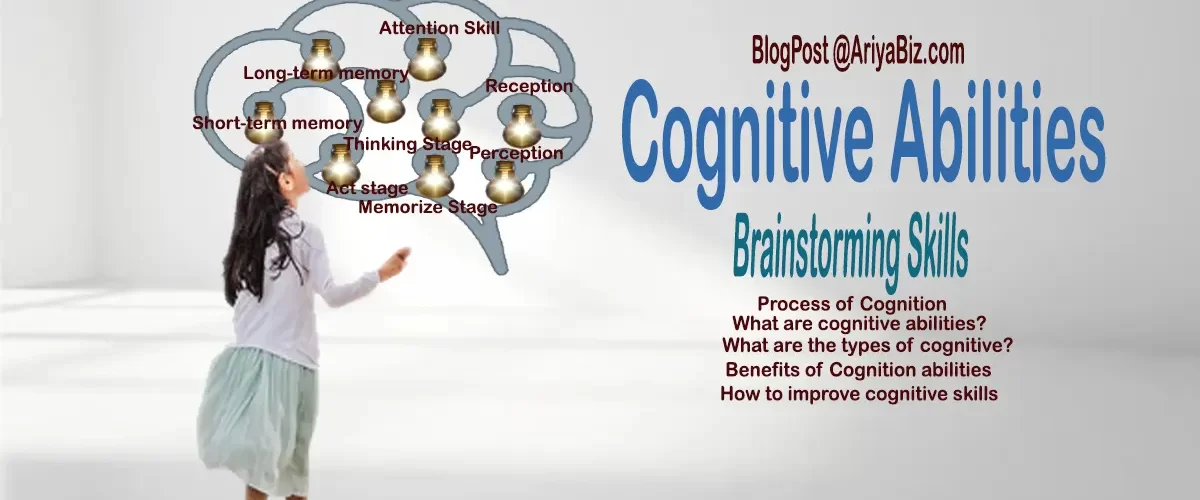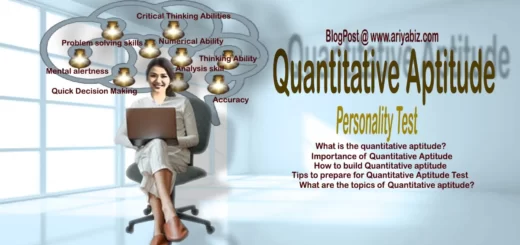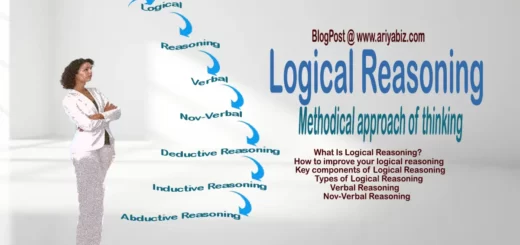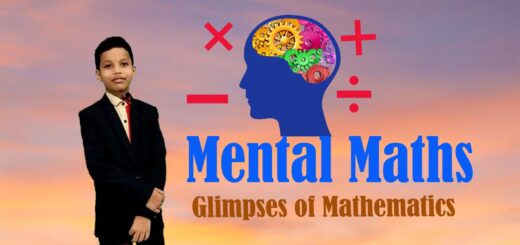Cognitive Abilities: Brainstorming Skills in 2024

Welcome Readers in the Blog Post ‘Cognitive Abilities: Brainstorming Skills in 2024. In this blog post we are going to discover Cognitive Abilities, its types, benefits, parameter measuring and improve strength of skill.
What is meaning of cognitive?
Cognition means ‘Anubhuti’ in Hindi language. It can be explored to you as how a person understands the world and acts on it. It is the set of our mental abilities or processes that are part of nearly every human action while he was awake. It is fully mental process of acquiring, understanding and gaining knowledge through senses of organs.
What is the cognitive ability?
Our cogitation abilities, which are a group of mental skills related to the way the human brain processes information, include the ability to pay attention, memorize, manipulate data, solve problems, and reasoning about our surroundings.
For children of school age, cognitive development is crucial. Cognitive abilities can be thought as a person’s learning tools. One can complete tasks easily and effectively with the right equipment and skills. According to neuroscientists, different brain regions function best at various ages. Our capacity for quick thought and memory also referred to as fluid intelligence, peaks around the age of 20, after which it slowly starts to decline.
Why cognitive abilities are are important in the life?
Every area of life benefits greatly from having strong cognitive abilities. These abilities aid in organizing incoming data and distributing it to the proper parts of the brain. By being able to successfully complete tasks, learning to improve and master these skills leads to a better success. Weak Cognitive skills impacts on retaining, grasping, or using any kind of information gathered. These abilities are important because they enable you to identify patterns, analyze problems, comprehend information, and effectively brainstorm activities.
Benefits of Cognition abilities
Our daily activities make it simple for us by strengthen our cognitive abilities. The following benefits we can get by our cognitive abilities or individual’s capacity for learning:
Strengthen you to maintain concentration and focus on a task for an extended period of time
Strengthen you to maintain concentration and focus on a task despite distractions;
Strengthen you to remember information while juggling multiple tasks;
Strengthen you to access previously stored information;
Strengthen you to retain information while using it;
Strengthen you to reason, form ideas, and solve problems;
Strengthen you to analyze, blend, and segment sounds;
Strengthen you to think abstractly.
Because of this, the distinction between good and average learners is made by cognitive abilities. Learning is quick and straightforward when cognitive abilities are strong. Learning is difficult when cognitive abilities are poor, on other hand your ability will enable you to achieve your goals and help you learn new things throughout your life.
You may also like to read this
Process of Cognition
If you can recognize your cognitive processes and your strengths and weaknesses, your process of learning is relatively simple. The main stages of cognition are include, taking in information, giving it meaning, organizing and manipulating it, storing and retrieving it, applying it, and acts on it. The following Cognition stages that are the most crucial:-
Reception
Receiving information through our senses—sight, hearing, smell, taste, and touch—is the first step in the learning process. Our brains decide what information is important and what should be ignored in just a few hundredths of a second, and we are completely unaware of it. All of this processing is unconscious.
Perception
The information chosen in the Recognition and interpretation stage is further processed to identify and interpret it at the following stage of the learning sequence.
Visual perception
The cognitive part of interpreting visual stimuli is visual perception. Visual perception is simply what the brain does with the information the eye sees.
Auditory perception
The ability to recognize, interpret, and give meaning to sound is known as auditory perception. It involves what the brain does with the sounds that it hears.
Phonological awareness
Knowing the different sounds (phonemes) that make up words is known as phonological awareness.
Memorize Stage
In order to manipulate information, compare, comprehend, and learn, memory is crucial at every stage of the information processing process.
The Thinking Stage
In the thinking processing stage we use cognitive skills like memorize, analysis the situation.
Direction to act stage
One of the unique cognitive abilities known as executive functions is working memory that executive functions act.
List of Cognitive Abilities
Cognitive Abilities is a huge umbrella contains of skills under it. The following list of cognitive skill types and subtypes includes:
Attention Skill
Attention Skill is an ability to manage competing demands in our environment and the ability to maintain concentration on a single task, object, action, or thought.
This ability to pay attention has a significant impact on the perception process.
There are various types of attention skill, including the following:
Sustained attention
Sustained attention able we to focus for extended periods of time.
Focused attention
Focused attention refers to focusing on the most crucial elements of your task by avoiding distractions.
Selective attention
Selective attention is the capacity to concentrate on one thing out of many while ignoring everything else around us.
Alternating attention
The capacity to shift the focus between two or more tasks is known as alternate attention.
Divided or limited attention
Our capacity to multitask and focus on two or more things at once is known as divided or limited attention. This is similar to alternating attention, but with divided attention, responses to various stimuli are made simultaneously rather than shifting focus.
Memory ability (MA)
Knowledge is encoded, saved, and later retrieved using memory. Recalling different kinds of information, such as past events, images, and sensations is a key component of memory ability. Short-term, long-term, and sensory memories are the three main types of memory.
You may also like to read this
Short-term memory or Temporary memory
It is primary or active memory, and it only retains information while you are using it or for a short time after. It is also called working memory.
Long-term memory
This keeps the information for a very long time.
Sensory memory
This involves recalling the feeling of someone’s touch, smell, or visual sensations.
Information processing ability (IPA)
Information processing capacity (IPA) is the capacity to move information from working memory to long-term memory.
Logical reasoning ability (LRA)
The ability to solve problems logically and draw inferences from patterns using ethical, abstract, or abstract thinking is referred to as logical reasoning.
Representation ability (RA)
Representation ability (RA) is one of the fundamental skills that are used in mathematics to connect logical thought to abstract ideas in order to comprehend mathematics.
Non verbal or Visual and auditory processing skills
Non verbal or Visual and auditory processing skills helps in the effective interpretation of visual information as well as the understanding of auditory information.
Processing speed Skills
Your brain can more quickly interpret information and apply it to a task or project if your processing speed is high.
Thinking transformation ability (TCA)
Our ability Metacognition, or the capacity to reflect on the act of thinking, is linked to better learning.
Critical Thinking
The act of questioning, analyzing, interpreting, and making a judgment about what you read, hear, say, or write is known as critical thinking.
Motor Skills
It is the capacity to move our self as well as the capacity to control objects.
Core- cognitive Abilities
The following are core cognitive skills:
Quantitative aptitude
The ability to perceive and process numbers and related symbols in order to carry out simple arithmetic operations and make estimates is referred to as quantitative aptitude. It is considered to be a high-order thinking competency, quantitative aptitude is very beneficial.
Skills required for Quantitative Aptitude
Numerical Ability
It depends on how quickly and accurately you can perform basic mathematical operations like addition, subtraction, multiplication, and division.
Designing Ability
You should be able to comprehend abstract mathematical patterns or multidimensional figures in order to understand concepts like symmetry, arrangements, patterns, points, shapes, and space, among others.
Data Analysis ability by Statistics and Modern Mathematics
With these abilities we are familiar with the theories, equations, models, and statistical analysis of any given data in order to be able to gather and examine a sizable amount of information and data.
Verbal Ability
A crucial skill is communication. A person’s capacity to comprehend oral and written communication is evaluated by verbal ability. The following skills are necessary for verbal ability:-
Reading Skills
Writing Skills
A well-written and well-structured writing
Listening Skills
Grammar Skills
Vocabulary Skills
Reasoning Aptitude
This competency evaluates a candidate’s capacity for innovation.
Fluid Intelligence
Fluid intelligence is the capacity to recognize patterns and logical rules in a timely manner.
Problem Solving
Spatial Reasoning
It is the capacity to interpret visual input, comprehend the spatial relationships between objects, and visualize scenarios and images.
Critical Thinking
Decision Making
Each and cognitive ability contributes to the processing of every information. This means that no matter what kind of information is presented to a person, their ability to understand, remember, or use that information will be impacted if even one of these skills is lacking.
How to improve cognitive skills
Cognitive abilities can be improved through a healthy lifestyle and focused practice.
You can perform better in almost every area of your life by developing your cognitive abilities.
Here are some suggestions for strengthen your cognitive abilities:
Reduce your stress because it is unhealthy. It interferes with your ability to think clearly, your performance at work, and your health.
Give eating nourishing food top priority.
Use the “Anapansati Meditation” technique to focus by controlling your thoughts and breathing process taught by Buddha.
Look after your body.
Train your brain by doing puzzles, like Sudoku or crosswords. Play chess or another mind-stimulating game.
Before you go to sleep or during your break, read a book.
Compose a story or commit your favorite song to memory.
Be physically active
Accept new experiences or challenges
Get sufficient rest and sleep
You may also like to read this
Non-cognitive skills
Although non-cognitive skills peak in late adulthood and develop much more slowly than cognitive skills, they can actually strengthen cognitive skills to the point where they are dependent on one another. Non-cognitive skills, also referred to as “soft skills,” are more closely linked to a person’s temperament, attitudes, and personality traits. These include the following:-
Conscientiousness
Perseverance
Teamwork
Grit
Decision-making
Interpersonal skills
Emotional maturity
Empathy
Conclusion
Last but not least, developing these skills can increase your productivity by enhancing your capacity to carry out tasks effectively and efficiently. This blog post gives you insight into why you are having some difficulties and which brain functions you might need to hone in order to perform better. If you are interested in learning more about your cognitive strengths and weaknesses, this blog post ideas may improve your life. Go on reading! I’m grateful.



